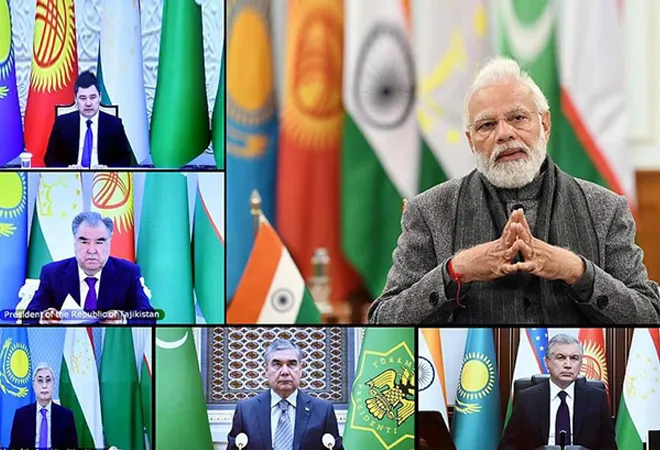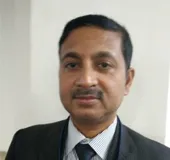
India and the Central Asian Republics have embarked on a new era of robust strategic partnership that was reflected by the successful conclusion of first-ever summit hosted by the Prime Minister of India, Narendra Modi, recently on 27 January 2022 in virtual format. This event was attended by the presidents of the Republic of Kazakhstan, Kyrgyzstan, Tajikistan, Turkmenistan, and Uzbekistan. The first India-Central Asia Summit, while coinciding with the celebrations of the 30th anniversary of establishment of diplomatic relations between India and the Central Asian countries, is considered as a landmark event that resonates the strong resolve of the leaders of two sides in taking up the relations to newer heights in a comprehensive and enduring manner. The summit has accounted for the far-reaching ramifications in determining stability, security, and geostrategic equilibrium in New Delhi’s western frontier, thereby, showcasing the efficacy of India’s “Extended Neighbourhood Policy” in addressing the emerging challenges in the region with strong determination, under the spirit of reformed multilateralism and transparency in global governance.
Over the last few years, India and the Central Asian countries have been rapidly consolidating strategic engagement in addressing the emerging challenges, based on mutual trust, understanding, and shared vision of security and progress for the people of both sides. The relations between India and the Central Asian countries witnessed a remarkable upswing when Prime Minister Narendra Modi visited all five countries back-to-back in July 2015, thereby, highlighting the strategic significance of the growing partnership while reinvigorating the historical, social, and cultural connections. This momentum has further got traction during the January 2022 Summit, when the leaders discussed the entire gamut of critical proposals of mutual interest to strengthen cooperation, especially in areas of defence and security, trade and connectivity, development cooperation, medical and healthcare cooperation, energy security, cultural and people-to-people contacts, apart from unanimously reiterating their support for a peaceful, secure, and stable Afghanistan, with an inclusive government, for preserving the security and stability in the region. Keeping in mind the growing engagement between India and the Central Asian countries, it can be well argued that the two sides are all set to work together to shape the trajectory of geostrategic balance in the critical region in New Delhi’s western neighbourhood, which eventually is going to have long-term implications in the global paradigm.
India and the Central Asian countries have been rapidly consolidating strategic engagement in addressing the emerging challenges, based on mutual trust, understanding, and shared vision of security and progress for the people of both sides.
The recent summit visualised an ambitious roadmap for the coming years and focused on a concrete action plan towards further enhancing the strategic partnership. The proposal to establish “India-Central Asia Centre” in New Delhi to function as a Secretariat for the India-Central Asia Summit biannually is a landmark decision towards strengthening institutional collaboration. The heightened activism was further reflected by the proposal to create an “India-Central Asia Parliamentary Forum” to enable robust deliberations between the legislatures of these countries. Concurrently, the two sides agreed to organise a number of activities including issuance of joint postal stamps to celebrate the 30th anniversary of establishment of diplomatic relations. All such decisions are momentous and categorically symbolise the extensiveness of socio-politico-economic synergy.
Prime Minister Modi, while hosting the summit, outlined three major objectives for the event—“First, to make it clear that cooperation between India and Central Asia is essential for regional security and prosperity. From Indian point of view, I would like to emphasise that Central Asia is central to India’s vision of an integrated and stable extended neighbourhood. The second objective is to give an effective structure to our cooperation. This will establish a framework of regular interactions at different levels and among various stakeholders. And, the third objective is to create an ambitious roadmap for our cooperation.”
The above remarks of PM Modi resonate strong underpinnings of the growing strategic engagements between the two over the years along with a futuristic vision, by aiming to adopt an integrated approach for robust cooperation in New Delhi’s extended neighbourhood.
Taking note of the current situation in Afghanistan, which is in close proximity to all six countries, the leaders while showcasing support for a stable Afghanistan also emphasised on respecting the sovereignty, unity, and territorial integrity, and non-interference in Afghanistan’s internal affairs.
During the summit, to address the emerging security challenges in the region, especially in the backdrop of developments in Afghanistan, the leaders called for upgrading the existing defence partnership while agreeing to consider holding joint counterterrorism exercises to achieve a “World free of Terror”. Taking note of the current situation in Afghanistan, which is in close proximity to all six countries, the leaders while showcasing support for a stable Afghanistan also emphasised on respecting the sovereignty, unity, and territorial integrity, and non-interference in Afghanistan’s internal affairs. The summsit clearly emphasised that Afghanistan is a common concern for all the six countries, thus, the consolidation of security cooperation is going to be paramount to ensure stability in the region. The six leaders also arrived at a broad ‘regional consensus’ on establishing representative and inclusive government, combating terrorism and drug trafficking, providing humanitarian assistance to the people of Afghanistan, and preserving the rights of women, children, and other national ethnic groups and minorities. The decision to establish a Joint Working Group (JWG) to monitor the developments in Afghanistan is a concrete step towards enhancing diplomatic efforts.
Trade and connectivity
The development of mutual connectivity to enhance trade and commerce between India and the Central Asian countries in the context of landlocked geographical terrain and insufficient overland connectivity facilities was another highlight of the summit. The connectivity projects were visualised by the leaders as “force-multiplier for trade and economic cooperation, and contacts between countries and people” and therefore, they need to be upgraded with top priority. The two sides agreed to utilise the services of the Shahid Beheshti Terminal at the Chabahar Port for facilitating trade connectivity. For this purpose, a JWG has also been established to streamline the connectivity process. It was also agreed upon to optimally utilise the International North-South Transport Corridor (INSTC) as well as Ashgabat Agreement on International Transport and Transit Corridor (ITTC) to enhance connectivity between India and the Central Asian countries.
Energy cooperation
At the summit, the leaders deliberated comprehensively on ways and means to strengthen energy cooperation that largely defines the contours of the evolving relations. The leaders also reiterated their steadfast commitment towards optimal harnessing of energy resources for ensuring energy security for the countries in an inclusive manner. As the Central Asian region is endowed with rich energy resources, especially crude oil, natural gas, coal, minerals and New Delhi’s energy requirement are expected to rise exponentially in years to come, a distinct urgency was perceptible in the deliberations. The Central Asian leaders showed interest in the Indian initiative of “One Sun, One World, One Grid” that aims at promoting inter-connected solar energy infrastructure at a global scale, which also has strong affinity to India-France-led International Solar Association (ISA). Towards enhancing energy connectivity, the summit emphasised on the need to establish cooperation between specialised national institutions in areas of renewable energy, information, digital, and advanced technologies.
As the Central Asian region is endowed with rich energy resources, especially crude oil, natural gas, coal, minerals and New Delhi’s energy requirement are expected to rise exponentially in years to come, a distinct urgency was perceptible in the deliberations.
COVID-19 and the Health sector
Regarding the COVID-19 pandemic, the leaders called for emboldening collective efforts to fight the health menace. The Summit categorically emphasised on the importance of “extensive vaccination, vaccine supply, transfer of technology, development of local production capacities, promotion of supply chains for medical products, and ensuring price transparency.” The Central Asian leaders’ appreciation for the approach “One Earth, One Health”, presented by PM Modi, symbolised the strength and commitment of the evolving relations in the health paradigm. The leaders also called for establishing a transparent mechanism to facilitate timely, effective, and non-discriminatory international response to global health challenges and ensuring equitable and affordable access to medicines and critical health supplies in the future. With a view to enhance people-to-people contact and harness human talent between each other, the Central Asian leaders appreciated New Delhi’s role in capacity building and human resource development of their countries. Concurrently, the summit’s emphatic call for propelling trade in sectors like medicine, healthcare, pharmaceuticals, education, information technology, infrastructure, agriculture, energy, climate change, space, amongst others reflect the promise and versatility of the evolving relations.
The consolidation and convergence of India-Central Asia relations are distinctly perceptible. The fact that the five Central Asian leaders were originally invited as chief guests for India’s Republic Day ceremony reflects the growing engagements. The deep commitment towards taking the evolving partnership to newer heights is potentially transformational for maintaining the geostrategic equilibrium of the region and the world as India takes over the Presidency of the G-20 grouping in 2023.
The views expressed above belong to the author(s). ORF research and analyses now available on Telegram! Click here to access our curated content — blogs, longforms and interviews.




 PREV
PREV


